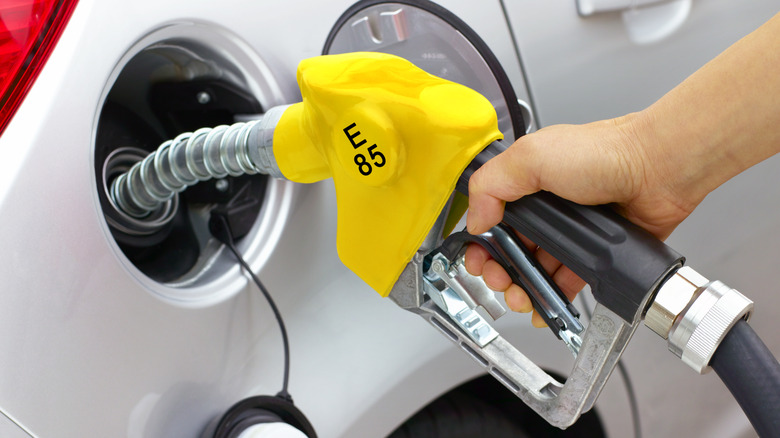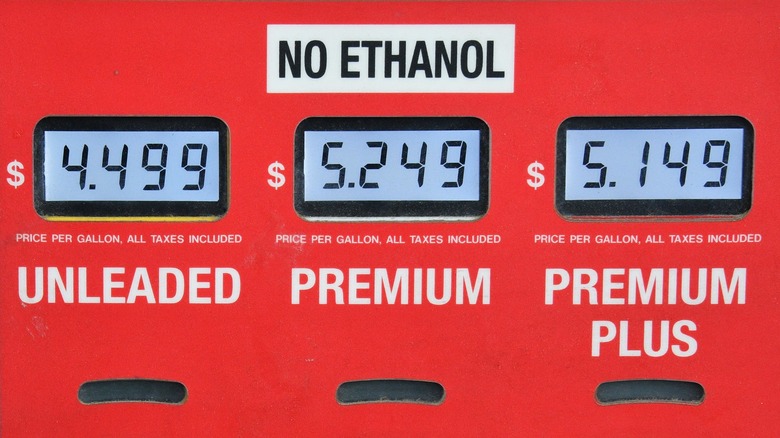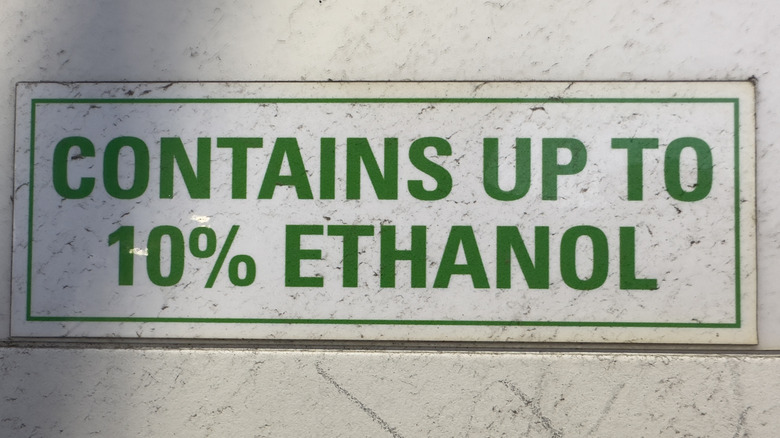Is Ethanol Really Bad For Your Car's Engine? What You Need To Know
With vehicles powered by electricity and alternative fuels like emission-reducing biodiesel becoming available to drivers everywhere, moves to lessen humanity's reliance on fossil fuels are starting to take root. Biofuels have, of course, long been part of the tricky renewable energy conversation, with ethanol being the bio option frequently referenced in such chats.
If you've yet to engage in the ethanol conversation, you may not realize that it is a biofuel derived largely from the fermentation of corn, wheat, grain sorghum, barley, and potatoes. You also may not realize that you've likely been pumping small amounts of it into your gas tank for years, as most gasoline sold in the U.S. has long been blended with at least 10% ethanol, and is occasionally blended up to 15%, with the latter fuel sometimes labeled Unleaded 88.
Over the years, the use of ethanol has often been a point of debate amongst those who support the use of biofuels and those who don't, in part because questions remain regarding its potential environmental impact. Depending on who you talk to, there may also be questions as to whether or not ethanol is bad for your vehicle's engine. Unfortunately, there does not appear to be an easy answer to that query, though it seems ethanol may be particularly damaging to engines made before 2001, as newer model cars are made with more ethanol-friendly materials. Here's everything you need to know about ethanol and your car engine.
Ethanol could potentially be bad for some engines
With some energy companies and automakers eyeing renewable ethanol fuel as a welcome alternative to petroleum-based gasoline, the biofuel has arguably been tested and re-tested as much as any in history. To be clear, the rigid testing endured by ethanol over the years has produced a lot of positive feedback. However, said tests have also proven that ethanol use may play a role in one damaging element in your vehicle's engine.
Yes, excessive use of ethanol may eventually lead to corrosion in your engine's fuel system. That's because it is an oxygenated fuel, meaning that it brings more oxygen into the fuel system than normal gasoline, and that could indeed lead to corrosive oxidation. Because ethanol is also an alcohol, it tends to attract more moisture than petroleum-based gasoline, which could elevate the risk of rust developing in engine components. Such risks are, understandably, higher for E85-rated fuel than E10 (10% ethanol) or E15 (15% ethanol), due to the elevated presence of the substance (as much as 85%) in its mixture.
It's worth noting, however, that those risks are limited by both the inclusion of corrosion-fighting additives in most pump fuels containing ethanol, and the limiting of the levels of ethanol included in gasoline mixtures to 10% or 15%. Likewise, it's believed that drivers will generally burn through a tank of gas fast enough that the risk for corrosion is dramatically decreased. As for E85 gas, if your vehicle is compatible with the high ethanol fuel or has been modified to properly process it, your engine may not experience any issues.
Ethanol gas does have its benefits
Apart from the potential to cause damage to your vehicle's engine, ethanol gas is also believed to reduce fuel economy in most vehicles by as much as 3% compared to petroleum-based fuels. It's also proven to have a shorter service life than traditional gasoline, lasting about three months in the tank as opposed to its counterpart's six-month lifespan. While the latter issue likely won't affect those who drive every day, it's safe to assume nobody is looking to reduce their vehicle's fuel efficiency these days, leading some to seek out ethanol-free gas.
The good news is that ethanol has some benefits that may outweigh those potential negatives. First and foremost, as opposed to petroleum-based fuels, ethanol is indeed a renewable resource, meaning we should never run out of it, assuming production levels remain constant. Ethanol is also cheaper and easier to both produce and transport than its counterpart, which means that even blending small amounts into the normal gas supply can help keep pump prices lower.
Perhaps most importantly, as ethanol is an oxygen-rich fuel, it burns considerably cleaner than traditional gasoline. As the rule goes, more oxygen in the mixture allows fuel to burn more completely during combustion, and that results in the reduction of damaging emissions like hydrocarbons and carbon monoxide. Ethanol also boosts octane levels in gasoline, helping increase both speed and horsepower in most vehicles while also reducing engine misfires. Those facts have helped E15 blended gasoline become a preferred fuel on the NASCAR circuit and may be enough to ease the minds of anyone worried about the effect of ethanol on their engines.


